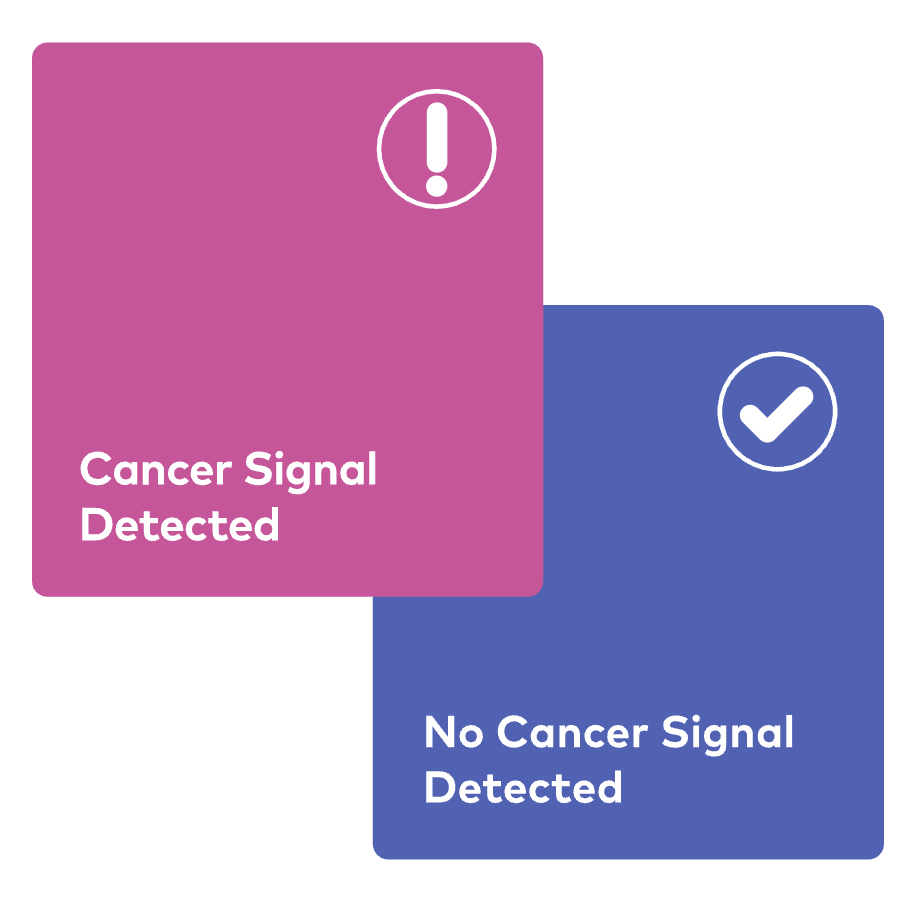


Use of the test is not recommended in individuals who are pregnant, 22 years old or younger, or undergoing active cancer treatment.
Aggressive cancers can develop quickly and without symptoms. Cancers growing in the body shed DNA into the bloodstream, the DNA fragments can act like a unique "fingerprint" of cancer. The Galleri® test may be able to detect such a “fingerprint” before a clinical diagnosis through conventional means.
The Galleri® test is not a hereditary screening test and does not predict your future genetic risk for cancer. The Galleri® test is a screening test and does not diagnose cancer. Diagnostic testing is required to confirm cancer.
Adrenal Cortical Carcinoma
Ampulla of Vater
Anus
Appendix, Carcinoma
Bile Ducts, Distal Bile Ducts, Intrahepatic
Bile Ducts, Perihilar Bladder, Urinary Bone Breast
Cervix
Colon and Rectum
Esophagus and Esophagogastric Junction
Gallbladder Gastrointestinal Stromal Tumor
Gestational Trophoblastic Neoplasms
Kidney
Larynx
Leukemia
Liver
Lung
Lymphoma (Hodgkin and Non-Hodgkin)
Melanoma of the Skin
Merkel Cell Carcinoma Mesothelioma, Malignant Pleural
Nasal Cavity and Paranasal Sinuses Nasopharynx
Neuroendocrine Tumors of the Appendix Neuroendocrine Tumors of the Colon and Rectum
Neuroendocrine Tumors of the Pancreas
Oral Cavity
Oropharynx (HPV-Mediated, p16+) Oropharynx (p16-) and Hypopharynx Ovary, Fallopian Tube and Primary Peritoneum
Pancreas, exocrine
Penis
Plasma Cell Myeloma and Plasma Cell
Disorders
Prostate
Small Intestine
Soft Tissue
Sarcoma of the Abdomen and Thoracic
Visceral Organs
Soft Tissue Sarcoma of the Head and Neck
Soft Tissue Sarcoma of the Retroperitoneum
Soft Tissue Sarcoma of the Trunk and Extremities
Soft Tissue Sarcoma Unusual Histologies and Sites
Stomach
Testis
Ureter, Renal Pelvis
Uterus, Carcinoma and Carcinosarcoma
Uterus, Sarcoma
Vagina
Vulva
The Galleri® test looks for a unique “fingerprint” of cancer by analyzing methylation patterns of cell-free DNA (cfDNA), screening for a signal shared by 50+ types of cancer. If detected, the test predicts the most likely origin of the cancer signal, to help guide the diagnostic workup.
The Galleri® test is a screening test and does not diagnose cancer. Diagnostic testing is needed to confirm cancer. The Galleri test identifies DNA in the blood stream shed by cancer cells and does not predict future genetic risk for cancer. It should be used in addition to healthcare provider recommended screening tests.


You will receive your test result about two weeks after your blood sample is received at the GRAIL lab.
There are two possible results:
Nearly 99% of people who use the Galleri© test will screen negative which is exactly what you want to hear. Continue with routine cancer screening tests your healthcare provider recommends.
If a cancer signal is found, results also can predict the tissue type or organ associated with the cancer signal. This vital information can help guide your healthcare provider with the next steps.
The Galleri® test is recommended for use in adults with an elevated risk for cancer, such as those age 50 or older. The test does not detect all cancers and should be used in addition to routine cancer screening tests recommended by a healthcare provider. The Galleri® test is intended to detect cancer signals and predict where in the body the cancer signal is located.
Use of the test is not recommended in individuals who are pregnant, 22 years old or younger, or undergoing active cancer treatment.Results should be interpreted by a healthcare provider in the context of medical history, clinical signs, and symptoms.
A test result of No Cancer Signal Detected does not rule out cancer. A test result of Cancer Signal Detected requires confirmatory diagnostic evaluation by medically established procedures (e.g., imaging) to confirm cancer.If cancer is not confirmed with further testing, it could mean that cancer is not present or testing was insufficient to detect cancer, including due to the cancer being located in a different part of the body. False positive (a cancer signal detected when cancer is not present) and false negative (a cancer signal not detected when cancer is present) test results do occur.
Rx only.
Laboratory/Test Information
The GRAIL clinical laboratory is certified under the Clinical Laboratory Improvement Amendments of 1988 (CLIA) and accredited by the College of American Pathologists. The Galleri® test was developed and its performance characteristics were determined by GRAIL. The Galleri® test has not been cleared or approved by the Food and Drug Administration. The GRAIL clinical laboratory is regulated under CLIA to perform high-complexity testing. The Galleri® test is intended for clinical purposes.